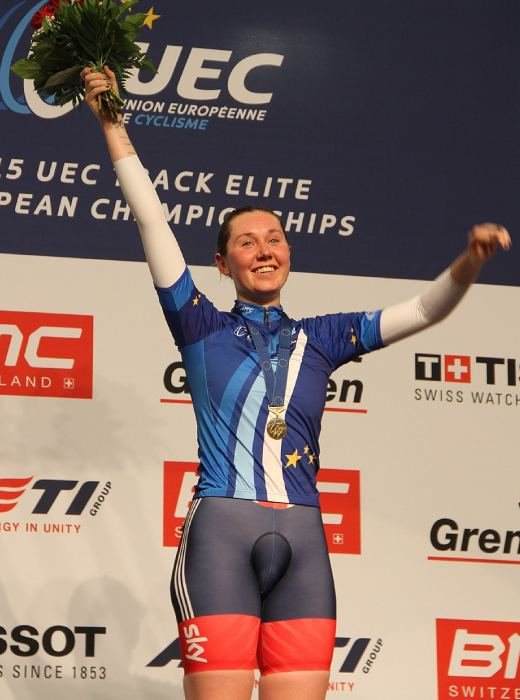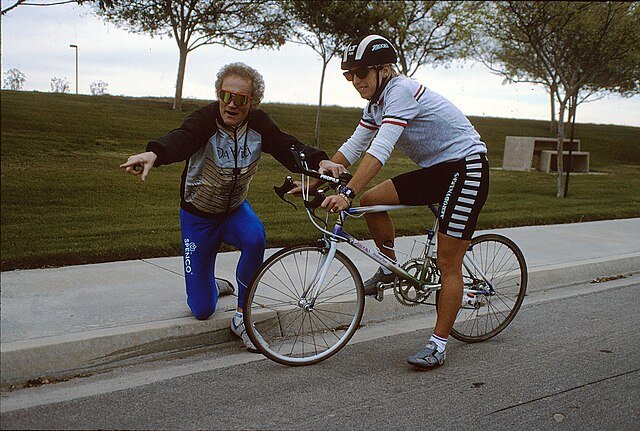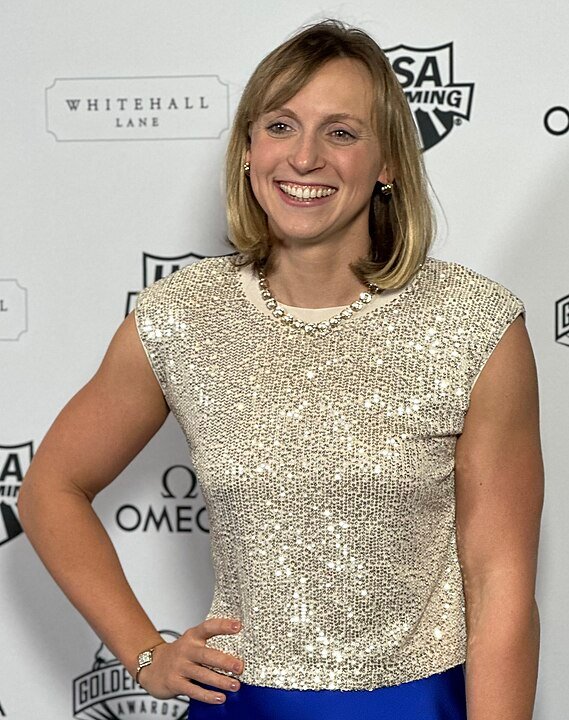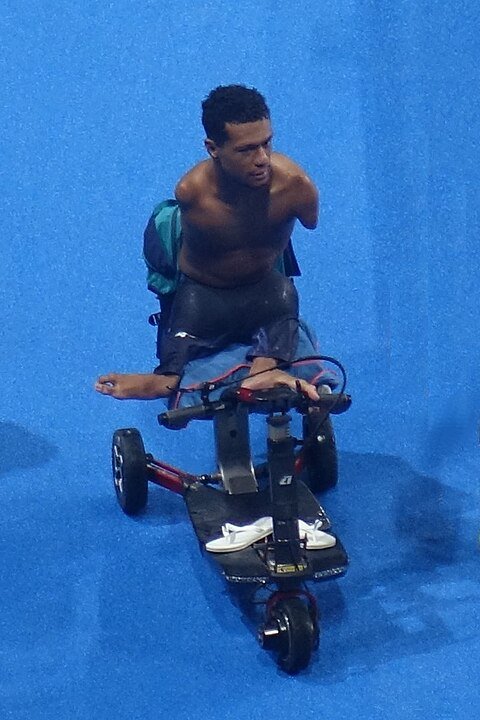How Britain’s most resilient cyclist transformed unimaginable loss into her greatest strength
There’s a moment in every athlete’s career when the facade cracks. When the pristine Instagram posts and victory podiums give way to something rawer, more human. For Katie Archibald, that moment came at 4:30 AM on August 23, 2022, lying in bed next to her partner Rab Wardell as his heart simply stopped beating.
“Mine stopped with it,” she would later say, her voice carrying the weight of a grief so profound it redefined her understanding of pain itself.
But this isn’t a story about endings. It’s about what happens when life strips you down to your absolute core – and you somehow find the audacity to rebuild yourself into something even stronger.
Katie Archibald: The Making of a Champion
Katie Archibald’s journey to cycling greatness wasn’t exactly conventional. Born in Glasgow on March 12, 1994, she spent her early years more comfortable in a swimming pool than on two wheels. Her family ran Archers Sleepcentre, where young Katie Archibald worked as a telesales operator—hardly the typical backstory for an Olympic champion.
Her father, Ian, was what you might diplomatically call “demanding.” He admitted to being “the father from hell” who “never let us win at anything.” Meanwhile, her mother provided the perfect counterbalance, serving as Katie’s unconditional cheerleader who believed she was “fantastic at whatever she tried.”
This psychological cocktail of relentless challenge and unwavering support would prove crucial. Because when Katie finally found cycling – starting on grass tracks in 2011 and progressing to hard tracks by 2012 – she approached it with the focused intensity of someone who’d learned that nothing worthwhile comes easy.
Her ascent was meteoric. Recruited into British Cycling’s Olympic Development Academy in November 2013, she made her Great Britain debut at the 2013 European Track Championships and immediately broke the world record twice. By 2014, she’d become Scotland’s first female track cycling world champion.
What followed was a decade of dominance that reads like a cycling fantasy novel: Olympic gold in Rio 2016’s Team Pursuit, double Olympic success in Tokyo 2020 with gold in the Madison and silver in Team Pursuit, multiple World Championship titles, and a record-breaking 20 gold medals at European Championships. Her brother John, also an elite cyclist, would join her in making history at the 2018 Commonwealth Games when they both medaled on the same day.
When Bodies Betray
But here’s what the medal count doesn’t tell you: Katie Archibald has endured what she calls “a career’s worth of injuries.” Her body became a battlefield of broken bones, torn ligaments, and surgical interventions. “Ankles that are always hurting, I’m missing a ligament in my knee, hips that have been wrecked countless times, I’ve had collarbone surgery three times – it’s all either filled with metal or a bit battered.”
2022 was particularly brutal. In May, she was hit by a car while training, flying over the bonnet of a 4×4 and sustaining sprained ankles and ligament damage. Earlier that year, she’d suffered a back fracture, broken collarbone, and concussion in a crash at the UCI Track Nations Cup.
Each injury chipped away at more than just her physical capabilities. Katie Archibald admitted she “got to the point where I really wasn’t coping” even before the tragedy that would redefine her understanding of suffering entirely.
The Unimaginable
Rab Wardell was more than Katie’s partner – he was her future. A fellow Scottish cyclist, he’d just achieved his lifelong dream two days earlier, winning the Scottish Mountain Bike Championships. They were lying in bed when he suffered a cardiac arrest at age 37.
Katie tried desperately to save him. She performed CPR until paramedics arrived within minutes. But sometimes, despite every effort, every desperate attempt, every prayer whispered into the darkness, the heart simply won’t restart.
“I love him so much and need him here with me,” she wrote in the immediate aftermath. “A lot of who I was, was Rab’s partner, and a huge amount of who I was in the future was [being] Rab’s partner.”
The loss was seismic. It wasn’t just grief—it was an identity crisis, a complete rewriting of her personal narrative. She was “terrified” and found herself thinking “What if” almost every second of every day.
Finding Ground in Motion
Three days after Rab’s death, Katie Archibald did something that surprised everyone, including herself: she got back on her bike.
“It was my one grounding thing,” she explained. And something extraordinary happened. The crippling anxiety that had plagued her cycling – exacerbated by years of injuries – simply vanished. “The worst thing had happened and that anxiety had gone. There was just a total blankness, a pain that really overwhelmed it.”
When she returned to competition, cycling had transformed from a demanding profession into something deeper: a space where grief couldn’t follow, where for 15-25 minutes at a time, she might actually forget her heartbreak.
Her gold medal at the 2023 UCI Track Cycling World Championships in Glasgow wasn’t just a victory – it was a declaration. Riding in Rab’s home city, she competed explicitly “in honour of her partner,” channeling his philosophy of prioritizing enjoyment over pressure. “Chill out and have fun,” she learned from him, contrasting it with the self-destructive “locking yourself in your room” mentality that had previously consumed her.
The Cruelest Twist
Just when it seemed Katie Archibald had found her way through the darkness, fate delivered another blow. Weeks before the Paris 2024 Olympics, she tripped over a garden step at home, dislocating her ankle and fracturing both her tibia and fibula, with two torn ligaments for good measure.
The “freak accident” required immediate surgery and ruled her out of Paris entirely. For most athletes, missing the Olympics would be devastating. But Katie had learned to calibrate pain differently.
“This [injury] is nowhere close to that kind of pain, that’s still agony,” she said, referring to losing Rab. “Missing Paris could not touch the sides on that.”
When you’ve experienced the absolute worst, everything else becomes manageable. It’s a brutal form of psychological recalibration, but it’s also strangely liberating.
Katie Archibald: The Art of Bouncing Forward
Katie’s return to competition at the Track Cycling World Championships in Denmark wasn’t just about bouncing back – it was about bouncing forward. She’d evolved, incorporating hard-won wisdom about sustainability and self-care.
“I want to chill out a bit on the bike and start challenging myself more off it,” she revealed, planning to work with new coaches and delegate more control. This represents a seismic shift from her previously “stubborn and domineering” approach.
She’s also pursuing an Access course at Glasgow University, potentially leading to a nursing degree. It’s a strategic diversification of identity—insurance against having her entire sense of self tied to one pursuit, no matter how successful.
Anthony Morton, her cycling coach, praised her “relentless drive and dedication” and “backbone like no other,” noting that “not many athletes have gone through the adversities and setbacks Katie has had to.” But Katie’s resilience isn’t just about toughness—it’s about intelligence, adaptation, and the courage to fundamentally change her approach.
The Science of Setbacks
What makes Katie’s story compelling isn’t just her ability to overcome – it’s how she’s reframed her relationship with adversity itself. “Setbacks in life can be very motivating,” she believes, viewing challenges not as barriers but as catalysts for growth.
This isn’t toxic positivity or Instagram inspiration-speak. It’s a hard-earned philosophy forged in the crucible of real loss. When she looks ahead to the Los Angeles 2028 Olympics, she consciously avoids framing it as “unfinished business” from her missed Paris opportunity, recognizing that as a “toxic driver.”
Instead, she’s motivated by something more sustainable: “I know that I’m good at this. I know that I really enjoy it. I feel super motivated for LA.”
The Network Effect
Katie Archibald’s journey illuminates something crucial about resilience: it’s rarely a solo act. Her support network has been extraordinary, from her parents’ complementary approaches to motivation, to her teammates who honored her by winning Olympic bronze in Paris while she was sidelined, to Rab’s mother, who despite her own grief provides Katie with her “biggest day-to-day help.”
The cycling community has embraced her through every setback, offering what she describes as a unique form of “kindness” that might not always be traditional but is deeply valuable. This ecosystem of support provides crucial scaffolding during the reconstruction phases that follow major life disruptions.
Looking Forward
As Katie prepares for future competitions, including the 2026 Commonwealth Games in Glasgow, her story offers a masterclass in sustainable excellence. She’s learned to prioritize mental health alongside physical performance, to delegate rather than control every aspect of her program, and to build multiple sources of identity and purpose.
Her recent performances, including gold at the 2024 World Championships, prove that this evolved approach doesn’t compromise her competitive edge – it enhances it.
Stephen Park, British Cycling’s Performance Director, marveled at her “incredible resilience” and ability to “get up every day, get back on the bike, get back into training and be in a position to turn up here, really get out and deliver her best.”
The Alchemy Continues
Katie Archibald’s story isn’t finished. At 30, she’s targeting LA 2028 with the wisdom of someone who’s been stripped down to her essence and rebuilt herself stronger. She’s learned that resilience isn’t about returning to your previous state – it’s about continuous evolution, about transforming pain into purpose and setbacks into comebacks.
“Recovery is possible, even from major setbacks,” she embodies this truth daily. More importantly, she’s discovered that cycling provides her with something beyond medals and records: “I realize I hadn’t thought about it for 15-25 minutes, and there was a delight in that.”
In a world obsessed with peak performance and perfect outcomes, Katie Archibald offers something more valuable: a blueprint for authentic human resilience. She’s shown that the most profound victories aren’t always the ones that come with gold medals—sometimes they’re simply the courage to get back on the bike, to find 25 minutes of peace, to transform the worst day of your life into the foundation for everything that comes next.
That’s not just athletic excellence. That’s alchemy of the highest order.
Katie’s story of transforming profound loss into unshakeable purpose isn’t unique in the world of elite sport. Across disciplines and continents, athletes have discovered that grief, when channeled correctly, can become the most powerful fuel of all. Take Matthias Steiner, the German weightlifter who turned his own devastating loss into unbreakable faith – and lifted his way to Olympic gold with a strength that transcended the physical. Sometimes the heaviest weights we carry aren’t made of iron and steel.
Photo: By Nicola, Wikimedia Commons, CC-by-sa 4.0, CC BY-SA 4.0,




